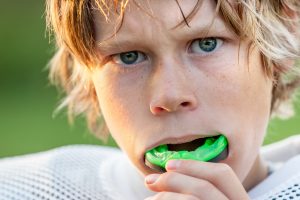 Everyone knows how much Australians love contact sports, but they may be placing their oral health at risk by wearing ill fitting mouthguards. Mouthguards are critical athletic equipment designed to protect the teeth and mouth in the event of impact. Some research even suggests that a properly fitted custom mouthguard may even reduce the risk of concussion and traumatic brain injury.
Everyone knows how much Australians love contact sports, but they may be placing their oral health at risk by wearing ill fitting mouthguards. Mouthguards are critical athletic equipment designed to protect the teeth and mouth in the event of impact. Some research even suggests that a properly fitted custom mouthguard may even reduce the risk of concussion and traumatic brain injury.
According to recent research by the Australian Dental Association, about 75% of Australian adults and just over half (53.3%) of children wear over the counter mouthguards when playing sports and believe themselves to be adequately protected. While custom fitted mouthguards may cost a bit more than over the counter mouthguards, they offer much more protection. In fact, using an over the counter mouthguard can be as bad as, or even worse than, not wearing a mouthguard at all.
Risks of wearing over the counter mouthguards
According to the Australian Society of Orthodontists, mouth and jaw injuries are among the most common sports related injuries. Some injuries that can occur include teeth being knocked out, broken, or displaced, fracture or dislocation of the jaw, and lacerations to the teeth or gums.
Mouthguards are most important for athletes engaged in contact sports like hockey or rugby, but are also important for those engaged in non-contact sports like skating or gymnastics, and other activities that can result in impact; like cycling, skating, or trampolining.
New policies on mouthguards
In response to these new findings, the ADA and Sports Medicine Australia have teamed up to establish new guidelines regarding the use of mouthguards in sports. These new guidelines include recommendations that all athletes wear custom fitted mouthguards during all practices as well as games and for coaches and managers to adopt a strict policy of checking for compliance and removing noncompliant athletes from training and games.
Mouthguards and brain injury
While mouthguards may help protect against mouth and jaw injuries, it may seem like mouthguards would not make a difference in concussions and brain injuries. A study published in the May/June 2014 issue of General Dentistry randomly assigned three high school football teams to wear custom fitted mouthguards and another three teams to wear the over the counter mouthguard of their choice. Athletes on all six teams wore the same type of helmet. Over the season, 8.3% of the athletes in the over the counter mouthguard group suffered concussions, while only 3.6% of the custom mouthguard wearers suffered concussions, a decrease of more than half. The dentists who conducted the study say more research is needed, but the results are clear. Custom fitted mouthguards do more than just protect teeth.
Caring for your mouthguard
Proper care of your mouthguard will ensure that it continues to protect you. Failure to care properly for your mouthguard may affect the fit and make it uncomfortable to wear; and we all know that comfortable equipment is more likely to be used consistently.
Mouthguards need to be replaced periodically; any time they begin to show signs of wear or damage. For children and adolescents, mouthguards will need to be replaced more often as their mouths grow and the guard does not fit as well.
To care for your mouthguard:
- Rinse your mouthguard before and after each use and soak once a week in an oral appliance cleaning solution. There are also instant disinfection sprays available, made specifically for mouthguards.
- Store your mouthguard in a ventilated container and never leave it where a pet might be able to chew on it.
- Be careful not to leave your mouthguard in the sun or a hot vehicle.
- Take your mouthguard with you to dental checkups for a thorough inspection and cleaning.
To learn more about the importance of custom mouthguards or to have a mouthguard custom fitted, please call to arrange an appointment on 07 3278 0580 now.

Comments are closed.